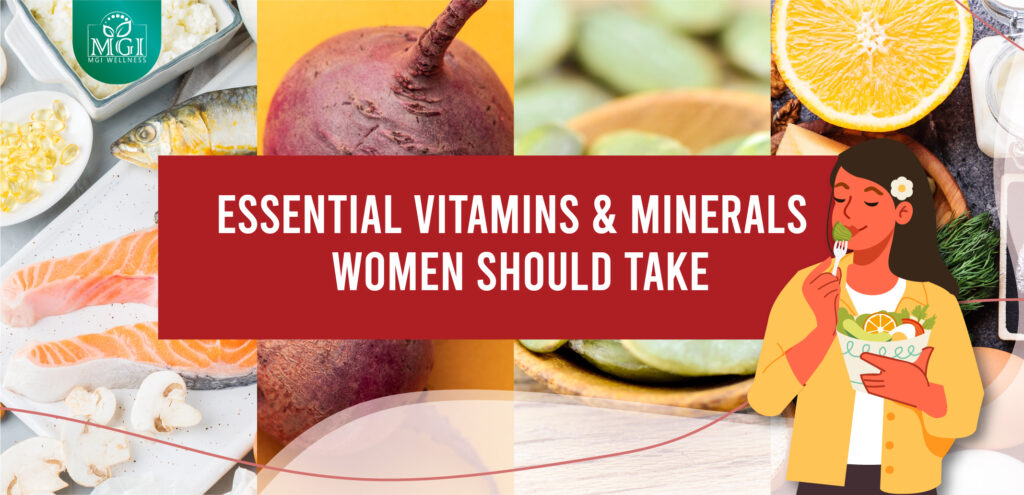Wellness
Essential Vitamins & Minerals Women Should Take
A woman’s body goes through multiple changes in physical, mental and hormonal, which makes them subject to specific nutrients that in needs of special attention throughout their lifespan. For example, teen nutritional requirement differs from those of postmenopausal women, and pregnant and lactating women require more particular nutrients than non-pregnant women. So, it is important to get daily dose of all vitamins and minerals at any costs, but these are the most essential vitamins and minerals women should take on an everyday basis:
Folic Acid/ Folate (Vitamin B9)
All women capable of becoming pregnant is recommended to obtain adequate amounts of folate to reduce the risk of neural tube defects (NTDs), birth defects caused by abnormal development of the neural tube and other birth defects. This because to ensure that adequate folate will be available very early in every pregnancy even though the pregnancies are unplanned.
The Recommended Nutrient Intake (RNI) for Malaysia 2017 recommends 400 to 600 μg/day of folate either from whole foods, fortified foods or dietary supplements for all women planning of pregnancy.
Folate requirements increase during pregnancy because the developing embryo/ fetus requires folate to form new cells, tissues, and organs, and also needed for the closure of the neural tube (the precursor to the brain and spinal cord).
The neural tube closes fairly early in pregnancy, around the sixth week of pregnancy, when many women are unaware that they are pregnant. Thus, supplementation with folate must be done during the periconceptual period (about one month before and at least one month after conception).
In a study (2) involving 399 Malaysian women of childbearing age (140 Malay, 131 Chinese and 128 Indian), the median intake of folate was 202.4 μg/day (59.4 to 491.8 μg/day), which only achieved 50.6% of the RNI level. This shows that some women of childbearing age get insufficient amount of folate in a day.
Calcium
Calcium makes up the structure of bones, teeth and allows normal bodily movement by keeping tissue rigid, strong and flexible. Almost all calcium in the body is stored in the bones, and the body uses the bones as a reservoir and source of calcium to maintain calcium homeostasis.
Bone is constantly remodelling, with ongoing calcium resorption and deposition into new bone. Bone remodelling is essential to maintain serum calcium levels, change bone size throughout growth, and provide a supply of other minerals.
Postmenopausal women especially in need of calcium because menopause leads to bone loss, as decreases in estrogen production reduce calcium absorption and increase urinary calcium loss. They also can develop osteoporosis, in which bone strength is compromised because of lower bone mineral density (BMD) and bone quality.
On average, women lose approximately 1% of their BMD per year after menopause. These alterations contribute to a loss of bone mass and weak bones over time. The calcium RNI for women older than 50 years old is 1,200 mg/day compare to 1,000 mg/day for younger women to lessen bone loss after menopause.
A 2015 review (3) concludes that increasing calcium intake from dietary sources or by taking calcium supplements produces slight increases in BMD around 0.6 to 1.8% at all the five skeletal sites (total hip, total body, lumbar spine, femoral neck and forearm) in over two and a half years.
Iodine
Iodine is required for the production of maternal thyroid hormone, which essential for myelination of the central nervous system and normal fetus brain development. While severe iodine insufficiency during pregnancy can cause hypothyroidism and brain damage in the offspring, milder kinds of maternal deficiency can affect the offspring’s intellectual development and mental abilities.
Iodine is another mineral where the requirement is substantially increased during pregnancy; the RNI for iodine is increased from 100 to 200 μg/day during pregnancy and lactation.
The Ministry of Health (MOH) Malaysia has taken action to prevent and control iodine deficiency disorder (IDD) through the implementation of universal salt iodization (USI) for the whole Malaysia. Besides salt that has been fortified with iodine, oceans are the world’s main sources of iodine and very little of earths iodine is actually found in the soil.
These are some foods that rich in iodine that varied in our country including siput sedut (850 μg/100 g), ikan bilis (144 μg/100 g), kupang (113.2 μg/100 g), kepah (92.7 μg/100 g), and kerang (92.6 μg/100 g).
However, women should not take iodine supplements unless a doctor recommends them to because unnecessary iodine supplementation may negatively affect thyroid health. If you are concerns about your iodine levels, ask a healthcare provider for an advice.
Iron
Iron deficiency is more common in women of childbearing age, due to its relatively low iron-rich food intake and menstrual blood loss. This happen because the blood that loss through the menstruation cannot be replaced by the iron fast enough as how blood and iron flow out from the body.
During each menstrual cycle, women loss of iron is varying and in the range of 4 to 100 mg.
Adequate iron status of woman at the time of conception is also important for a healthy pregnancy, so that it can help minimize anemia during pregnancy and postpartum, and supply sufficient iron stores for a breastfed newborn until six months of age.
According to WHO survey (4), among pregnant women in Malaysia, 38% of them have anemia. Not surprisingly, the prevalence of anemia nationwide increased with each trimester, nearly 43% of women in the third trimester were anemic. Multiple pregnancies may also deplete a woman’s iron stores if the interval between pregnancies is short.
The pregnant woman requires iron to meet the increased production of red blood cells that deliver oxygen to the developing fetus, and the developing fetus requires iron for growth and development of all tissues and organs.
There is no specific iron intake for pregnant women, but taking daily iron supplements of 100 mg is very recommended for all non-anemic pregnant women, whereas in anemic pregnant women, higher doses are usually required.
In short, vitamins and minerals are essential to women’s health and play numerous roles in the body. Although most micronutrients are concentrated in foods and adequate intake can be reached by consuming a well-rounded diet, but some women cannot reach their micronutrients needs through diet alone. Then, women who are concerned that they may be at risk of developing vitamins and minerals deficiency should work with a qualified healthcare provider to ensure optimal micronutrients intake necessarily.
References
- Recommended Nutrient Intake (RNI) for Malaysia 2017. Putrajaya: National Coordinating Committee on Food and Nutrition (NCCFN), Ministry of Health (MOH) Malaysia, 2017.
- Khor G. L., Duraisamy G., Loh S. P. & Green T. Dietary and blood folate status of Malaysian women of childbearing age. Asia Pac J Clin Nutr. 2006; 15(3): 341-349.
- Tai V., Leung W., & et al. Calcium intake and bone mineral density: systematic review and meta-analysis. BMJ. 2015 Sep; 351: h4183.
- Mc Lean E., Cogswell M., Egli I., Wojdyla D. & de Benoist B. Worldwide prevalence of anaemia, WHO Vitamin and Mineral Nutrition Information System, 1993-2005. Public Health Nutr. 2009; 12: 444-454.


You really make it seem really easy with your presentation but I to find this matter to be actually one thing which I feel I’d by no means understand. It kind of feels too complex and extremely wide for me. I’m taking a look forward in your subsequent publish, I¦ll try to get the hold of it!
he blog was how do i say it… relevant, finally something that helped me. Thanks
Some genuinely fantastic information, Sword lily I detected this. “Leaders must encourage their organizations to dance to forms of music yet to be heard.” by Warren Bennis.
I’m impressed, I have to say. Really rarely do I encounter a weblog that’s both educative and entertaining, and let me inform you, you will have hit the nail on the head. Your concept is excellent; the difficulty is one thing that not enough individuals are talking intelligently about. I’m very comfortable that I stumbled across this in my search for one thing regarding this.
Some truly howling work on behalf of the owner of this site, perfectly outstanding content.
Its like you read my thoughts! You seem to understand a lot approximately this, such as you wrote the e-book in it or something. I believe that you simply could do with some percent to drive the message house a bit, but other than that, this is magnificent blog. A fantastic read. I will definitely be back.
Great tremendous things here. I am very satisfied to peer your post. Thanks so much and i’m having a look ahead to contact you. Will you kindly drop me a mail?
Pretty section of content. I just stumbled upon your website and in accession capital to assert that I acquire in fact enjoyed account your blog posts. Anyway I will be subscribing to your augment and even I achievement you access consistently rapidly.
I haven?t checked in here for some time since I thought it was getting boring, but the last few posts are great quality so I guess I?ll add you back to my everyday bloglist. You deserve it my friend 🙂